Exclusive: Hall of Fame GM Bill Polian on pros, cons of rookie Panthers QB Bryce Young
Bill Polian made it into the Pro Football Hall of Fame in 2015, honored as one of the NFL’s most extraordinary general managers.
The subject of this week’s “Sports Legends of the Carolinas” interview, Polian was a team-builder with a gift for pinpoint player evaluation and crisp contract negotiation. He revitalized the fortunes of three different NFL teams — Buffalo, Carolina and Indianapolis. He pushed the Panthers to the NFC championship game in their second year of existence, in 1996, and won a Super Bowl in Indianapolis. Polian was named the NFL’s Executive of the Year by The Sporting News a record six times.
Now 80 and still keeping his hand in the NFL with several media gigs, Polian has lived in the Lake Norman area just north of Charlotte for decades. He still closely follows the Panthers. A longtime mentor to new Carolina head coach Frank Reich, Polian employed Reich as a QB in Buffalo, immediately saw his coaching potential and eventually got Reich his first coaching job as a low-level assistant in Indianapolis.
In our interview, Polian spoke about Reich, current and past Panthers teams and the pros and cons of the Panthers starting 5-foot-10 rookie quarterback Bryce Young in 2023. This interview — a fuller version can be found on the “Sports Legends of the Carolinas” free podcast — has been edited for clarity and brevity.
Scott Fowler: The quarterbacks of your best teams in Buffalo, Carolina and Indianapolis all had prototypical height of 6-foot-3 or taller: Peyton Manning, Jim Kelly, Frank Reich, Kerry Collins. Was that a coincidence?
Bill Polian: Oh no, it wasn’t coincidental. In fact we were worried a little bit about Steve McNair (who the Panthers strongly considered drafting in 1995 rather than Collins) because he was untraditional, in the sense that he was about 6-1 ½. He was the forerunner of today’s quarterback, the so-called athletic quarterback.
And to this day, I’ve never seen a guy that threw as well as Steve. Honestly. I mean, he was just marvelous. He could make every single throw accurately. He and Patrick Mahomes are the two most gifted passers I’ve ever seen.
SF: Above Peyton and Kelly and everyone else?
BP: Oh yeah. Pure ability to throw the ball? McNair and Mahomes.
SF: But you still took Collins in 1995, who was about three inches taller. As for Bryce Young, the Panthers’ new No. 1 pick and rookie QB starter, he’s 5-foot-10. How much of a problem do you think that is?
BP: I don’t know that it’s a problem as much as a challenge. ... Bryce Young is not prototypical. He is much more like Drew Brees, who was just barely six feet, then he is anyone else.
But I always told our scouts, wherever I was, if we’re going to be wrong, let’s be wrong for the right reasons. And in Bryce’s case, he has everything else you want in a quarterback, except height and girth. He’s 5-foot-10. He’s going to be about 195 pounds.
So if you miss, it’s going to be because of the stature. There is no other miss factor in him whatsoever. None. He’s perfect.
If he was 6-2 and 210 pounds, the Bears never trade that pick.
SF: Why?
BP: Because he would be so “can’t miss.” Like Peyton.
If Bryce were 6-2 and 210 pounds, he’d be Joe Burrow.
Polian on Bryce Young’s likely career arc
SF: What kind of career do you think Bryce Young will have?
BP: You have to go to the protection scheme that New Orleans used, making it big and wide in the middle to make sure that you’ve got throwing lanes for him. I think if they protect him correctly — and he takes care of himself in terms of extending and getting down and not taking the kinds of hits that can knock you out of a ballgame — he’ll have a fine career.

We took a lot of short players in Indianapolis because Tony (Dungy) and I, and our scouting staff, did a lot of studies on could we play with short players? The answer is yes — Dwight Freeney (a 6-1 pass rusher who was a seven-time Pro Bowler) being the most obvious one.
They do tend to have — to the extent that there’s a sample size — shorter careers than the bigger, longer guys.
SF: Why do short players have shorter careers?
BP: We don’t know. We can’t really pinpoint it. But would you logically sit there and expect Bryce to play 15 or more years, like Aaron (Rodgers) and Peyton? Maybe not.
Drew Brees played (20 years) though. So you can hit the jackpot. And other than height and girth, there is no other reason to say “No” to Bryce Young. None whatsoever.
Polian on 2023 Panthers: ‘far from a complete team’
SF: A big-picture question: How will the Panthers do this year?
BP: Well, I think it’ll be a bit of a struggle through Week 8, because they’re learning a new offense, new skills and new techniques on defense. From Week 8 or so on, I think the arrow will go up ... and they will be a competitive team.
I think the fans are going to like what they see in Bryce. He’s going to struggle, as all rookies do, but I think he will grow and be better at the end of the year.
But this is far from a complete team. There’s a lot of work that has to be done on the personnel side. And as far as I’m concerned, they couldn’t have better people than (general manager) Scott Fitterer and (assistant GM) Dan Morgan and his whole group. They’re really outstanding. So they’ll get there. Look at this year’s draft — not just orchestrating the trade to get up there and get Bryce but some of the others who will be producers almost immediately. But there’s a lot of building still to be done.
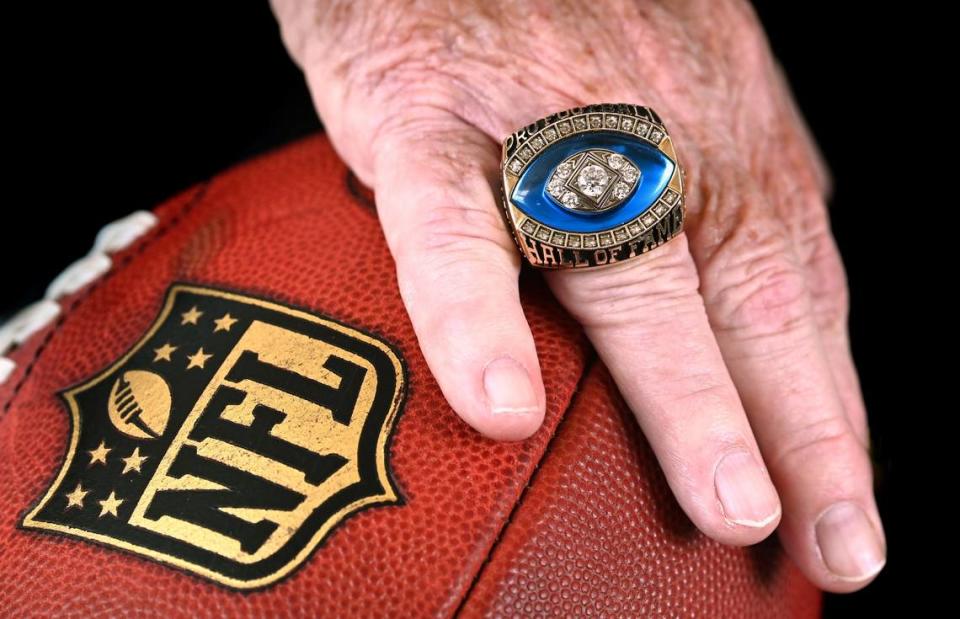
SF: What else do the Panthers still need?
BP: (Greg) Olsen (type of) tight end. There needs to be another rusher beside Brian Burns. They probably need another inside rusher. And certainly in the secondary, probably a safety who can impact the game, both run and pass.
SF: I wonder about their wide receivers.
BP: They’re going to be fine. The guys that are here now are good solid pros. (Running back Miles) Sanders and the others are good pickups…. But they are bridges. The No. 1 receiver that’s going to be the guy when Bryce hits his stride isn’t here yet ... Miles Sanders and (Hayden) Hurst ought to be good for a little while.
SF: So Bryce Young’s favorite all-time target as a Panther isn’t actually here yet?
BP: Well, it could be (rookie wide receiver Jonathan) Mingo.
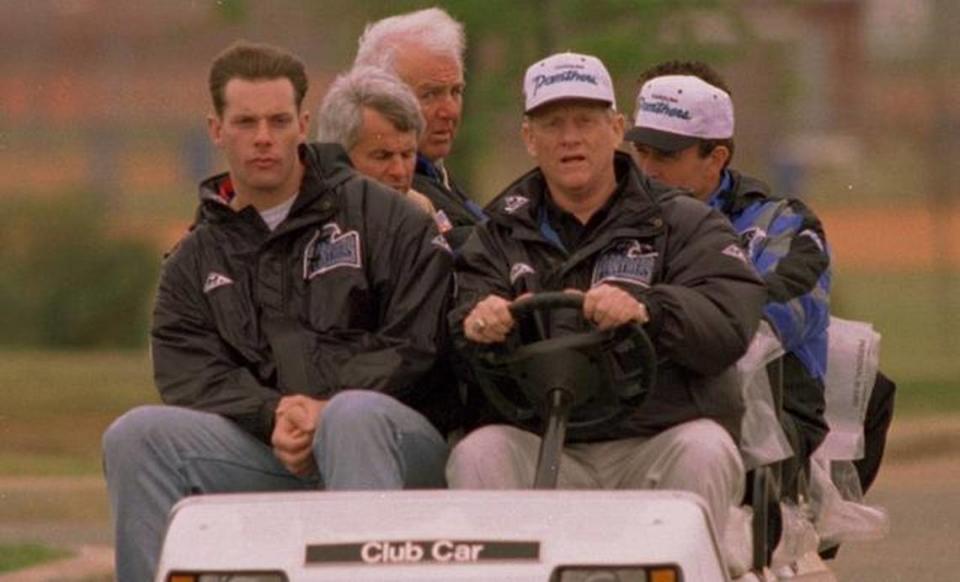
SF: When you started with the Panthers, you had Kerry Collins throwing the ball to Willie Green and Mark Carrier the first year in 1995.
BP: Right. And then Moose (Muhsin Muhammad, a newly-named Panthers Hall of Honor wide receiver, drafted in 1996) became the guy.
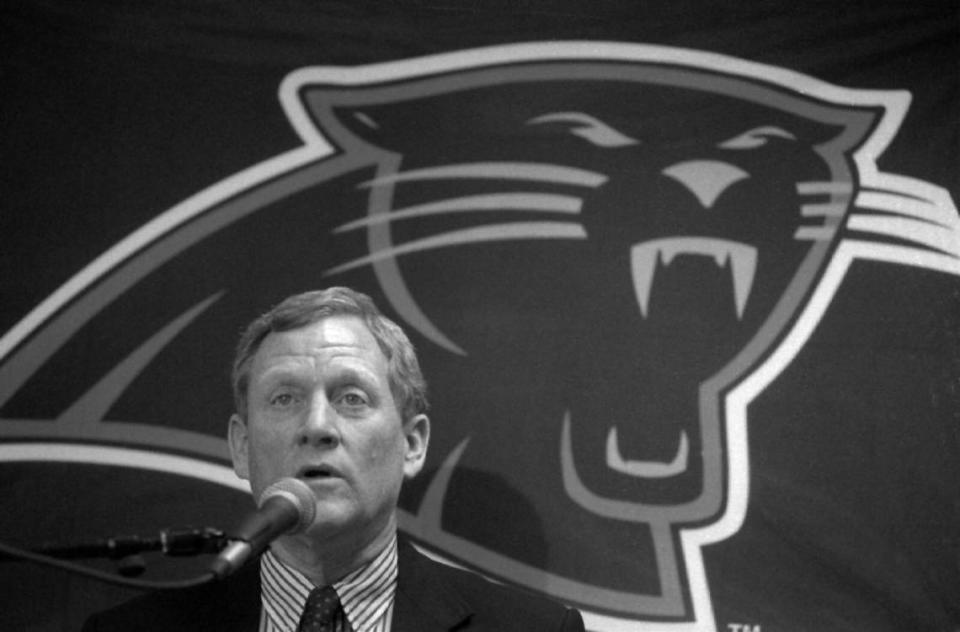
The Panthers’ expansion days
SF: For those who didn’t follow the Panthers back then, with you as GM, the team hit the ground running as an expansion team and went 7-9 in its first year. You drafted Kerry Collins No. 5 overall in 1995 and built a defense-first team filled with free agents like Sam Mills, Kevin Greene and Lamar Lathon. They were nicknamed the “Grumpy Old Men” and made the NFC championship game in 1996.
BP: They were ornery on the field. And (placekicker) John Kasay, too. He was our first free-agent signing.
SF: So why did you leave for Indianapolis?
BP: Very simple. I wasn’t in alignment with ownership (the Richardson family) as to how we should go forward. The team was good, but not good enough, and I felt that we had to make a number of personnel changes. Dom (Capers, the Panthers’ first head coach) was terrific. He and I to this day are great friends.
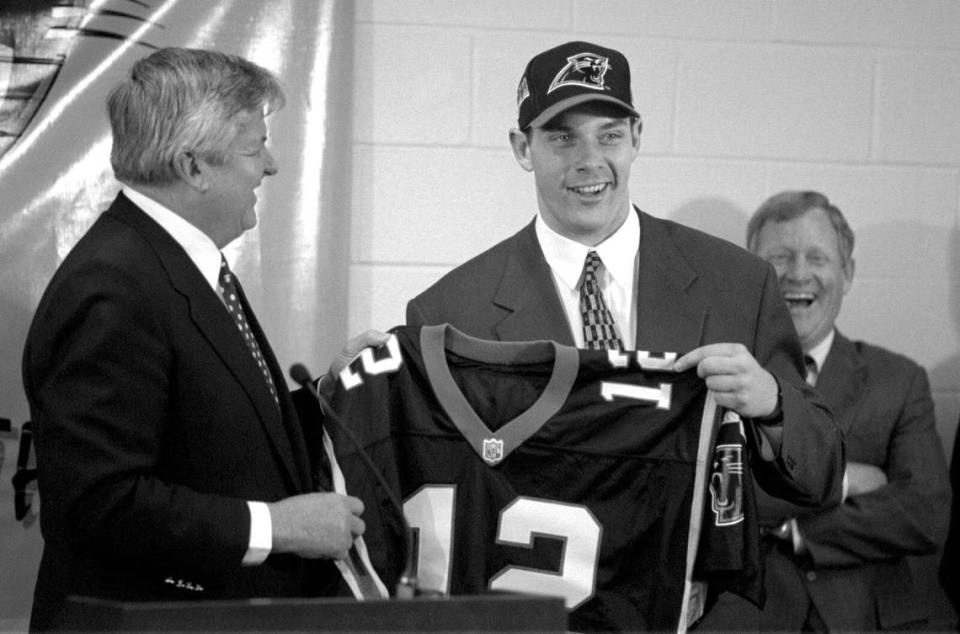
But we needed to make some personnel changes because we were aging on defense. And there wasn’t going to be another Super Bowl run unless we changed things. And we weren’t in alignment on that. I just felt like if that’s the case, then you’re better off to move on.
Panthers and Peyton Manning?!
SF: You went to Indianapolis and drafted Peyton Manning in 1998. But before the Colts made that pick, isn’t it true that you had some talks with the Panthers about trading that pick to Carolina for Kerry Collins and a package of other assets? So then Carolina, in all likelihood, would have drafted Peyton?
BP: Well, there was talk of that. A lot of talk, back and forth.
But in the final analysis, we felt like it was better to draft Peyton. (A lot of this had to do with) the Colts’ place in the pecking order of sports in the city. We needed to pick Peyton and start fresh with it, with a new face who was going to be the guy that people could rally around. ... At the time, basketball was first in Indianapolis, with the Pacers.
And it was a college town. (Indiana) basketball was No. 1. Purdue basketball. Purdue football. The Indy 500. I mean, we did a survey and the Colts were fifth (in terms of sports popularity, before Manning arrived).
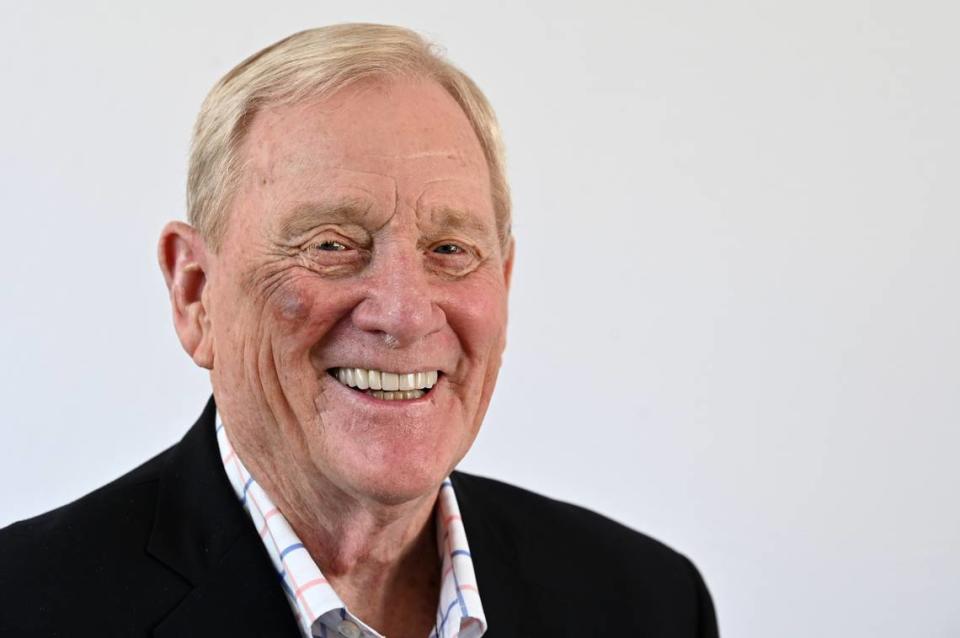
SF: While in Indianapolis, you gave your former backup QB in Buffalo, Frank Reich, his start as an assistant coach. There is a theory about Reich that he is just a quarterback whisperer. What would you say to that?
BP: I don’t know how those things get started, but nothing could be further from the truth. First of all as a quarterback in Buffalo, (Reich) interacted with the whole team. He had a big part in scripting the entire offense and putting together the no-huddle offense and actually calling plays (from the sideline, as a backup QB).
He interacted with the offensive linemen with respect to protections. He interacted with the offensive coordinator on a daily basis with respect to play design. He was a cerebral quarterback who really worked at it and was looking at the whole picture all the time.
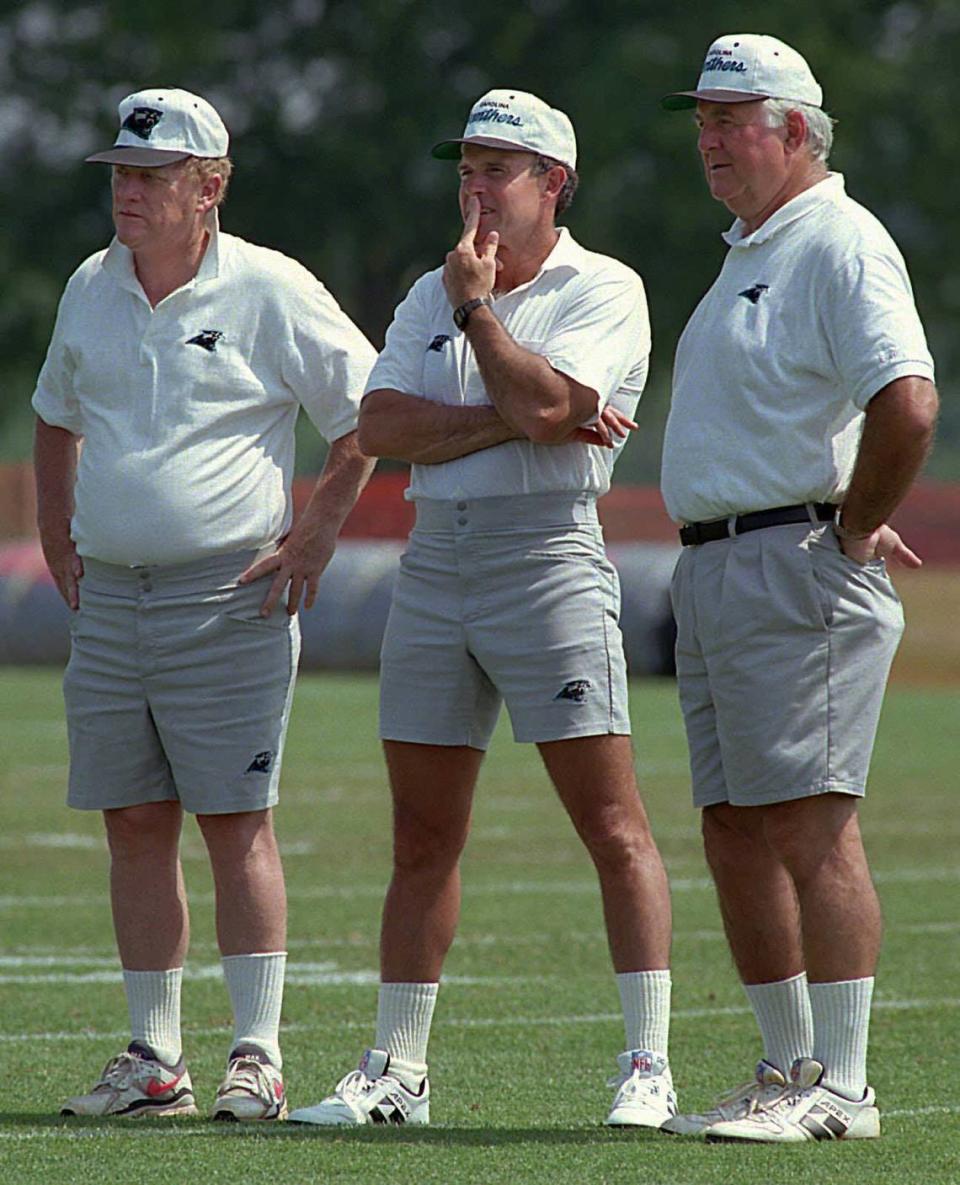
And he connected with everybody on the team. He was and is a devout Christian. He really had great relationships with guys on the defensive side. I mean, we had quite a crew there in Buffalo, right? Bruce Smith. Andre Reed. It was diverse, both racially and personality-wise. Frank was able to connect with all of them. So yes, he will help the quarterback without question, but he’s also going to be invested in virtually everything.
SF: You had a reputation as a tempestuous GM. Did you use that to your advantage as a negotiator with agents?
BP: Truthfully, yes. As a negotiator, you’ve got to use everything you have. But in those days, I was so focused on winning, that I didn’t really understand that ... there’s another side.
It isn’t just bulldozing your way through, toward your goal. You have to find a way to get people to work together and find common ground. ... I was able to grow. My demeanor changed.
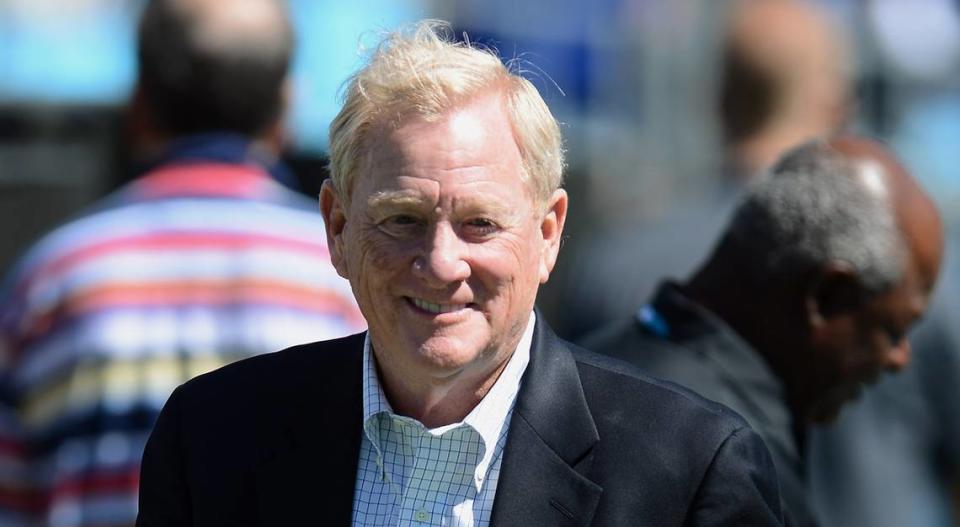
But tempestuous? Yeah, I kinda like that word.... Around the time of (Polian’s) Hall of Fame induction (in 2015), (former Colts star center) Jeff Saturday was doing an interview with somebody who said, “Bill’s so different from the way he’s portrayed. You see him around his grandchildren and he’s always laughing and playing games and things like that.”
And Jeff said, “Yeah — we didn’t see very much of Grandpa Bill.”
For much more from this interview with Bill Polian as well as exclusive conversations with other “Sports Legends” guests like Armanti Edwards, Mike Krzyzewski, Roy Williams, Dale Earnhardt Jr. , Jake Delhomme and Dawn Staley, check out the “Sports Legends of the Carolinas” podcast. The “Sports Legends of the Carolinas” coffee table book debuts in November 2023 and is now available to pre-order — at a 20% discount — at SportsLegendsBook.com.



